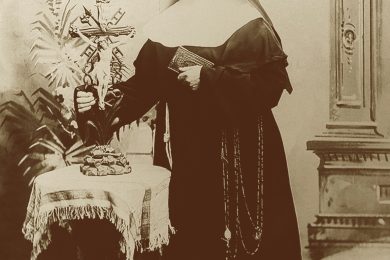By Celia Wolf-Devine | OSV News
Regular prayer has always been regarded as an essential part of Christian life. In the psalms, the believer is compared to a tree planted by a stream that still bears fruit, even in times of drought, remaining full of sap and green, even in old age.
Jesus is the one who can give us living water, as he tells the Samaritan woman (Jn 4:10), and prayer is an important way in which we can open ourselves to receive this so that we, too, can remain full of sap and green amid the trials of life. “O God, you are my God — / it is you I seek! / For you my body yearns; / for you my soul thirsts, / In a land parched, lifeless, / and without water” (Ps 63:2).
Our desire for God indicates that God is already at work in us, calling us to him. Realizing this puts prayer in a new light. It is not just something we do; it also involves inviting God to work in us — to transform us and conform us more to Christ. God is, in fact, present when we pray. As the 17th-century Carmelite Brother Lawrence put it: “You need not cry very loud; he is nearer to us than we are aware of.” Whether we are speaking words or singing or simply being silent, this sense of our longing for God and the reality of his presence should be a kind of constant background to our prayer.
If you know you need to pray more, but keep finding yourself getting to the end of the day and finding you have not prayed, you should think about what is holding you back.
“I’m too busy.” Don’t think of prayer as another thing you have to do, but as an opportunity to disengage yourself from the rush of practical activities and experience some of the leisureliness and eternity of God. Even a short period of this sort of prayer is like finding an oasis in the desert.
We also feel embarrassment. We may be afraid to invite God in because we want everything to be clean and orderly, but we know that much is chaotic, conflicted, misshapen, even ugly. The answer is twofold. First, just as you would visit someone out of friendship regardless of her messy house, so Jesus wants to visit us. Second, if we wait until everything is orderly and beautiful, we will wait forever, because it is only the action of the Holy Spirit that can purify our hearts.
Our sinfulness in general can overwhelm us sometimes, as when St. Peter cries, “Depart from me, for I am a sinful man” (Lk 5:8). But Jesus came to call sinners and shared meals with tax collectors and prostitutes.
We also fear that God will take us over or ask us to give up things to which we are attached. God always leaves us free. He may, in fact, ask us to give up something we are attached to, but if so, he will gradually lead us to see it differently and be less attracted to it. If, like most of us, you have already tried to do everything your own way and made a mess of things, the idea that God really does know what is good for us better than we do begins to look pretty plausible.
We all want to experience God’s presence and not just believe that he is present. But don’t assume you are not experiencing it because you are not having experiences like Saul on the Damascus Road or Teresa of Ávila. Dramatic experiences can and do happen. But more ordinarily, the sense of God’s presence is subtle and intermittent: a feeling that you are not alone, a moment of heightened life and peace, a sense of being held and stilled or comforted in times of sorrow or anguish, or perhaps a sudden clarity that reveals something deep about yourself and your situation.
The background image we have of God is very important for prayer. If you envision him as a harsh judge, this will get in the way of openness and trust. You might experiment with some images that are common in mystical literature. Imagine yourself as clay in the hands of the potter or as a house you invite him to come dwell in, or perhaps as the bridegroom of your soul.
Mystics have employed maternal imagery as well — for example, nursing at the breast of God; God as a powerful deliverer, coming to drive out all darkness and evil, is an image that may feel appropriate sometimes. I sometimes think of myself as a drowning swimmer and Jesus as the lifeguard coming to save me, so I feel moved to stop thrashing around, relax and let him lift and carry me. Or I think of sunbathing in his light, letting it warm me, being a flower that turns toward the light and opens its petals, or following his lead as I would follow the lead of a dancing partner.
A good analogy in Scripture is the garden. We are dry, bramble-infested ground which God weeds and waters and softens so we can bring forth fruit. We want to be like the good soil in the parable of the sower (Lk 8:15) — like those who “hearing the word, hold it fast in an honest and good heart, and bring forth fruit with patience.”
Lock prayer into your daily routine. A short period of prayer first thing in the morning before you turn on your computer, cellphone or TV is an especially valuable practice. We need to bring Christ to the world, so spend some time with him first before you get entangled in your daily activities. Pray before you make your list and let God give you his perspective on what is important. It is OK to sip your morning tea or coffee as you start. One way to structure it is the following:
— Read a little Scripture and see what stands out for you. The daily Mass readings are a good choice.
— Bring to God whatever is on your mind: things left over from yesterday, your emotions, your worries and fears, difficult situations you expect to encounter today, and try to let go of them. Offer him thanks for bringing you to the start of another day.
— A good opening prayer is from the Anglican prayer book: “Almighty God unto whom all hearts are open, all desires known, from whom no secrets are hid, cleanse the thoughts of our hearts by the inspiration of thy Holy Spirit that we may perfectly love thee and worthily magnify thy holy name.”
— Say or sing some sort of Holy Spirit invocation.
— Ask God to help you surrender to him, to let him dwell in you more deeply and live in him and for him more today than yesterday. Be sure to leave some quiet time.
— Do some sort of invocation of the Sacred Heart. I use the Litany of the Sacred Heart.
— Say a prayer of thanksgiving and ask for his guidance and protection throughout the day.
If you are bothered by distractions, just return gently to the prayers and don’t get upset at yourself for your poor concentration. Turn your worries into prayers for that situation. Keep a writing pad next to you for insights or things you need to do. Don’t pick at yourself or worry about whether you are doing it right. And don’t get discouraged if you don’t see quick results — either in the feelings you experience or in overcoming your faults.
God can work in us at all sorts of levels that we are not aware of. Just be faithful to prayer, ask him to transform your heart, putting your desires in the right order so the compass needle of your soul points to him, the true north, and trust he will complete the good work he has begun in you.
– – –
Celia Wolf-Devine writes from Rhode Island.






















